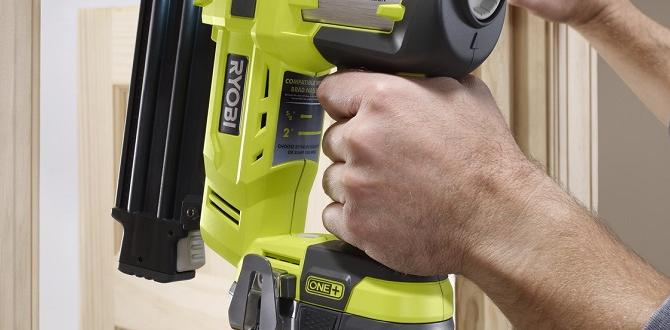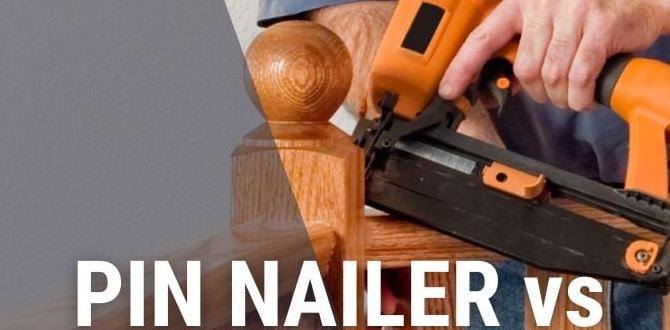Dewalt vs. Milwaukee Nailers: Get the essential breakdown! For DIYers, Milwaukee often leads in innovation and battery tech, while Dewalt offers robust performance and wide availability across various price points. Both are excellent choices; your best bet depends on your specific project needs and existing tool ecosystem. We’ll help you decide!
Hey there, DIY enthusiasts and aspiring woodworkers! Jack Shaffer, your friendly neighborhood Nailerguy, here. Are you standing at a crossroads, staring down the impressive lineups of Dewalt and Milwaukee nailers, wondering which one will be your trusty sidekick for that weekend project? It’s a common puzzle, and honestly, it can feel a bit overwhelming with all the options out there. But don’t you worry! Today, we’re going to demystify this whole Dewalt vs. Milwaukee nailer situation, making it super clear so you can grab the right tool with confidence. We’ll break down exactly what makes each brand tick, look at their strengths and weaknesses, and help you figure out which one fits your toolbox and your budget best. Stick with me, and by the end, you’ll know exactly which nailer is calling your name!
Table of Contents
Dewalt vs. Milwaukee Nailers: A Beginner’s Essential Guide
Choosing between Dewalt and Milwaukee for your nailer is like picking between two top athletes for your team. Both are incredibly skilled, reliable, and have their own loyal fan base. But they do things a little differently. As a beginner, understanding these differences is key to not just getting a nailer that works, but one that makes your projects smoother, safer, and more enjoyable.
Think about it: you’re excited to build that new deck, craft a beautiful bookshelf, or finally tackle that trim work. The last thing you want is a tool that’s awkward to use, constantly jams, or drains its battery faster than you can even get into a rhythm. That’s where this detailed comparison comes in. We’ll look at everything from power and performance to ergonomics and price.
Understanding Different Nailer Types
Before we dive headfirst into Dewalt vs. Milwaukee, let’s quickly touch on the common types of nailers you’ll encounter. Knowing these will help you understand the specific applications each brand excels in.
- Brad Nailers: These use very thin nails (16 or 18 gauge) and are perfect for delicate trim, molding, and intricate projects where you want minimal impact on the wood. You won’t see nail heads, or they’ll be very small.
- Finish Nailers: Slightly larger than brad nailers (15 or 16 gauge), they use thicker nails suitable for baseboards, crown molding, window casings, and other interior trim. They leave a small, easily fillable hole.
- Framing Nailers: These are the heavy-hitters. They use large, thick nails (often 2 to 3.5 inches) and are designed for framing walls, decks, and structural elements. They pack a serious punch and are built for durability.
- Staplers: While not technically nailers, they use staples and are often used for upholstery and construction sheathing.
The Case for Cordless: Why Battery-Powered is King
For most DIYers and hobbyists these days, cordless battery-powered nailers are the way to go. They offer incredible freedom of movement compared to pneumatic (air-powered) nailers, which require a bulky air compressor and constantly wrangling a hose. Electric coil nailers are another option, but they often lack the power and portability of battery models.
The freedom to move around a job site or your workshop without being tethered to an air source is a game-changer. No more tripping over hoses or worrying about compressor noise. This is where both Dewalt and Milwaukee truly shine, continually pushing the boundaries with their battery technology.
Dewalt Nailers: Reliability and Wide Reach
Dewalt has long been a trusted name in the professional and DIY tool space, known for its rugged dependability and extensive range of tools. Their cordless nailers are no exception, offering solid performance and a vast ecosystem of batteries that can power a wide array of their tools.
Dewalt’s Strengths
- Battery Ecosystem (20V MAX & FLEXVOLT): If you already own Dewalt 20V MAX tools, their cordless nailers will seamlessly integrate into your existing battery system. This can be a huge cost saver and convenience factor. Their FLEXVOLT line offers even more power for demanding applications like framing.
- Durability and Build Quality: Dewalt tools are generally built tough, designed to withstand the rigors of job sites. Their nailers often feel substantial and well-constructed.
- Wide Availability and Model Variety: You can find Dewalt nailers at most major hardware stores and online retailers. They offer a broad selection for almost every nailer type, often with competitive pricing.
- Consistent Firing: Dewalt’s brushless motor technology and advanced power delivery systems ensure consistent nail driving, even when firing rapidly or into hardwoods.
- User-Friendly Features: Many Dewalt models offer features like tool-free depth adjustment, stall release, and LED lights to help you work more efficiently and precisely.
Dewalt’s Potential Downsides
- Innovation Pace: While consistently reliable, Dewalt might sometimes be seen as slightly slower to adopt the absolute bleeding edge of battery or motor innovation compared to Milwaukee.
- Ergonomics on Some Models: Some users find certain Dewalt nailer models to be slightly bulkier or heavier than comparable Milwaukee options, though this is subjective and depends on the specific tool.
Popular Dewalt Nailer Examples
Dewalt offers a comprehensive range. For instance, their DC618K (18-Volt Cordless Brad Nailer Kit), though an older model, is still revered for its reliability. More modernly, their DCN680B 18-Gauge Brushless Brad Nailer or the DCN692B 30-Degree Cordless Framing Nailer are fantastic examples of their current offerings, leveraging brushless motor technology for better runtime and power.
Milwaukee Nailers: Innovation and Powerhouse Performance
Milwaukee has made massive strides in the cordless tool market, particularly with their M12 and M18 battery platforms and their focus on “FUEL” technology, which signifies their most advanced, high-performance cordless tools. When it comes to nailers, Milwaukee often aims to push the envelope in terms of compactness, power, and battery efficiency.
Milwaukee’s Strengths
- M18 FUEL™ Platform: Milwaukee’s M18 FUEL™ line is designed for extreme performance. Their nailers often boast impressive power, firing speed, and efficiency, rivaling pneumatic tools.
- Compact and Lightweight Designs: Milwaukee often excels at creating surprisingly compact and lightweight cordless nailers in their respective categories, making them easier to handle for extended periods or in tight spaces.
- Battery Technology: Milwaukee consistently innovates with its REDLITHIUM™ battery technology, offering longer runtimes, higher power output, and durability. Their XC (Extended Capacity) and HO (High Output) batteries are particularly impressive.
- Speed and Power: Many Milwaukee nailers are known for their rapid firing capability and ability to drive nails flush into hardwoods consistently, thanks to their powerful brushless motors and optimized pneumatic-like driving mechanisms.
- Ergonomics: Many users find Milwaukee tools, including their nailers, to be exceptionally well-balanced and comfortable to hold, with thoughtful grip designs.
Milwaukee’s Potential Downsides
- Price Point: Milwaukee’s FUEL™ line, while offering top-tier performance, can sometimes come with a higher price tag compared to Dewalt’s offerings, especially if you don’t already have M18 batteries.
- Availability of Less Common Nailer Types: While they cover the major bases, Dewalt historically might have a slightly wider breadth of specialized nailer types in their lineup, though Milwaukee is rapidly expanding.
Popular Milwaukee Nailer Examples
Milwaukee’s M18 FUEL™ line includes standouts like the 2740-20 M18 FUEL™ 18-Gauge Brad Nailer, praised for its compact size and power. The 2732-20 M18 FUEL™ 15-Gauge Finish Nailer is another favorite. For heavier jobs, the 2744-21 M18 FUEL™ 30-Degree Framing Nailer is a formidable contender, delivering consistent, powerful drives.
Head-to-Head: Key Comparison Points
Let’s put Dewalt and Milwaukee nailers side-by-side on the most important factors for a DIYer.
Power and Performance
Both brands deliver excellent power for their respective nailer categories. Dewalt’s 20V MAX and FLEXVOLT lines offer substantial power, capable of handling most trim and framing tasks. Milwaukee’s M18 FUEL™ line often pushes the envelope here, delivering performance that aggressively competes with, and sometimes surpasses, pneumatic tools, especially in raw driving power and speed for framing tasks.
For delicate trim work, both offer reliable performance, driving nails flush without damaging the wood. However, Milwaukee’s M18 FUEL™ nailers are often noted for their ability to maintain high firing speeds without as much of a power drop, which can be beneficial for repetitive tasks.
Battery Life and Compatibility
This is where Dewalt’s 20V MAX system offers a significant advantage if you’re already invested in it. You can use the same batteries across dozens of tools. Milwaukee’s M18 system is equally robust, and their REDLITHIUM™ batteries are renowned for their longevity and power delivery. If you’re starting fresh, consider which platform has the broader range of tools you might need in the future.
Battery size (Ah – Amp Hours) plays a big role. Larger Ah batteries will always provide more runtime. Both brands offer a range of battery sizes in their respective lines.
Ergonomics and Design
This is often a more subjective point, but many users find Milwaukee’s M18 FUEL™ nailers to be lighter and better balanced, leading to less fatigue during long work sessions. Dewalt’s nailers are generally well-designed, but on some models, they can feel a bit more substantial or less nimble.
Consider holding both if possible. Look at the grip, the balance, and how easy it is to access controls. Features like convenient depth adjustment wheels and non-marring tips are important for any nailer.
Durability and Build Quality
Both Dewalt and Milwaukee are known for robust construction. Dewalt has a long-standing reputation for building tools that can take a beating on job sites, and their nailers reflect this. Milwaukee, especially its FUEL™ line, uses high-quality components and engineering to ensure durability and reliable performance over time. You’re unlikely to go wrong with either in terms of longevity.
Price and Value
Generally, Dewalt can offer a slightly more budget-friendly entry point, especially if you catch sales or buy kits with batteries and chargers. Their broad availability also means you can often find deals. Milwaukee’s M18 FUEL™ line, while top-of-the-line, often commands a premium price due to its advanced technology and performance. However, if you value that cutting-edge innovation and performance, the long-term value can be excellent.
When comparing prices, always look at what’s included: bare tool, kit with battery and charger, and the battery’s Ah rating. A bare tool from one brand might be cheaper, but if you need to buy batteries separately, the overall cost could be higher.
Feature Comparison Table
Here’s a quick snapshot to help you visualize the differences:
| Feature | Dewalt Nailers | Milwaukee Nailers |
|---|---|---|
| Battery Platform | 20V MAX / FLEXVOLT | M18 (Standard & FUEL™) |
| Ecosystem Advantage | Excellent if you own other 20V MAX tools. | Excellent if you own other M18 tools. |
| Innovation Focus | Reliability, broad range, evolutionary improvements. | Cutting-edge tech, high performance (FUEL™), compactness. |
| Power (General) | Strong, consistent, handles most tasks well. | Exceptional, often rivals pneumatic, especially FUEL™. |
| Ergonomics | Good, sometimes perceived as bulkier. | Often praised for balance and lighter feel, especially FUEL™. |
| Durability | Very High, job-site proven. | Very High, premium components. |
| Price (General Entry) | Often more accessible. | Can be premium, especially FUEL™. |
| Model Variety | Extensive across many nailer types. | Rapidly expanding, strong in key areas. |
Choosing the Right Nailer: Your Project Matters!
So, how do you pick the one that’s perfect for you? Let’s break it down by common DIY scenarios.
For the Trim & Molding Master (or Aspiring One!)
If your projects are all about delicate interior trim, baseboards, crown molding, or furniture building, you’ll likely be looking at 18-gauge brad nailers or 15/16-gauge finish nailers.
- Dewalt: A Dewalt 18-gauge brad nailer or 15-gauge finish nailer will serve you incredibly well. They offer the precision and power needed for these tasks, and if you have Dewalt batteries, it’s a no-brainer.
- Milwaukee: Milwaukee’s M18 FUEL™ models in these categories are particularly impressive for their compact size and speed. If you do a lot of this kind of work and want a tool that’s easy to maneuver and fires quickly, they are top contenders.
For the Deck & Framing Warrior
When you’re building a deck, framing a shed, or working on more structural elements, you need a robust framing nailer. This is where power and drive depth are crucial.
- Dewalt: Dewalt’s cordless framing nailers, especially those in the FLEXVOLT line, offer the necessary power to consistently drive large nails into tough lumber. Their reliability on heavy-duty tasks is a major plus.
- Milwaukee: Milwaukee’s M18 FUEL™ framing nailers are beasts. They are designed to throw nails with serious force, often matching or exceeding pneumatic competitors. If you need maximum power and speed for rough carpentry, Milwaukee’s FUEL™ line is hard to beat.
For the All-Around DIYer
Many of us fall into this category, tackling a mix of projects. You might be building shelves one weekend and adding crown molding the next.
- Consider your existing tools: If you’re heavily invested in one battery platform, sticking with it for your nailer is usually the most cost-effective and convenient choice.
- Think about frequency: Will you be doing more trim work or more framing? This can help you prioritize the features of one brand over the other.
- Budget: If budget is a primary concern, Dewalt often offers more accessible options, especially when buying kits. However, Milwaukee’s FUEL™ line, while more expensive, might offer superior performance that justifies the cost for some.
Safety First! Essential Nailer Precautions
No matter which brand you choose, safety is paramount when using any nailer. These are powerful tools, and complacency can lead to serious injury.
- Always wear safety glasses: This is non-negotiable. Flying debris or ricocheting nails are real hazards. ANSI Z87.1-certified eyewear is recommended.
- Understand your nailer’s trigger: Most nailers have sequential or contact actuation modes. Know which one you’re using and keep the safety tip engaged. Never modify the trigger mechanism.
- Never point the nailer at yourself or others: Treat every nailer as if it were loaded.
- Keep fingers away from the firing mechanism: Don’t put your finger on the trigger or near the nose piece when not actively firing.
- Use the correct nails: Using the wrong type or size of nail can cause jams or misfires. Always refer to your tool’s manual.
- Secure your workpiece: Make sure the material you are nailing into is stable and won’t shift unexpectedly.
- Disconnect power/battery when not in use or changing nails: Always be safe when the tool is not in operation.
For more comprehensive safety guidelines, refer to resources like the <a href="https://www.osha.gov/sites/default/files/2018-09/NIOSH-NRTL-201



